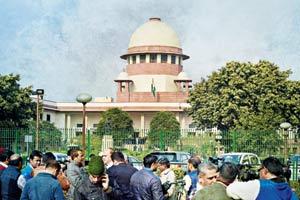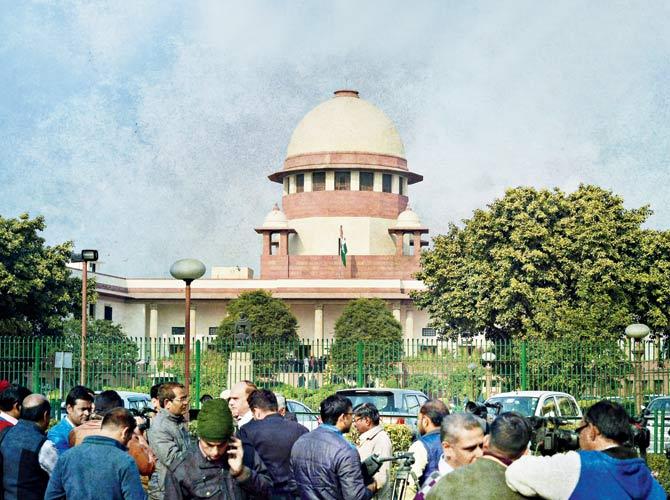The law criminalizes unnatural sex, including the carnal intercourse between consenting adults of the same gender

 Supreme Court
Supreme Court
ADVERTISEMENT
The Supreme Court on Monday sought the Centre's view on a hotelier's plea for striking down Section 377 of the Indian Penal Code. The law criminalizes unnatural sex, including the carnal intercourse between consenting adults of the same gender.
A bench headed by Chief Justice Dipak Misra issued a notice to the Centre on the plea by the Lalit Suri hospitality group head Kesav Suri, seeking the 'Right to choice of sexual orientation' to be declared as part of the fundamental Right to life and personal liberty under Article 21 of the Constitution.
The bench, also comprising Justices A M Khanwilkar and D Y Chandrachud, considered the submission of senior advocate Mukul Rohatgi on behalf of the hotelier and asked the Centre to respond within a week. The bench then ordered tagging of the petition with other similar pleas which have already been referred to the Constitution bench.
The apex court had on January 8 referred to a larger bench a plea seeking decriminalisation of gay sex between two consenting adults. Section 377 of the IPC refers to 'unnatural offences' and says whoever voluntarily has carnal intercourse against the order of nature with any man, woman or animal, shall be punished with imprisonment for life, or with imprisonment of either description for a term which may extend to ten years, and shall also be liable to pay a fine.
Suri, in his plea, has said that he himself being part of the lesbian, gays, bi-sexual, transgender and Queer (LGBTQ) community, has suffered mentally and been stigmatised on account of his sexual orientation at a personal and professional front.
"The petitioner had to deal with non-acceptance of his fundamental and intrinsic choice, ie; his homosexuality with his family and thereafter even professionally questions were raised about his sexuality, which does not happen normally with heterosexual individuals," the plea said.
Suri also said he was constantly living under the fear of a false or potential prosecution under section 377 of the IPC and was unable to express his relationship and his right to choose his sexual partner without being worried. The petition also pointed out that the LGBTQ community is being "ridiculed" in various spheres of life and equal work or pay opportunities were not given to them.
While consenting to reconsider its 2013 verdict criminalising gay sex, the apex court had on January 8 said that the section of people or individuals who exercises their choice should never "remain in a state of fear". It had also said the determination of the order of nature is not a constant phenomenon as social morality changes from age to age. The apex court is already seized of similar pleas filed by celebrities like dancer N S Johar, chef Ritu Dalmia and another hotelier Aman Nath challenging the validity of section 377 criminalising the consensual gay sex.
The Delhi High Court, on July 2, 2009, had legalised homosexual acts among consenting adults holding that the 149-year-old law making it a criminal offence is violative of the fundamental rights and making it not punishable.
Also Read:
Edited by mid-day online desk, with inputs from PTI
Catch up on all the latest Crime, National, International and Hatke news here. Also download the new mid-day Android and iOS apps to get latest updates
 Subscribe today by clicking the link and stay updated with the latest news!" Click here!
Subscribe today by clicking the link and stay updated with the latest news!" Click here!






